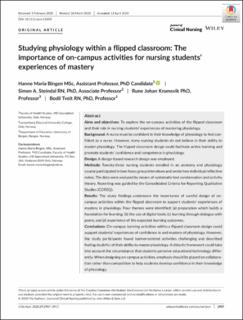Studying physiology within a flipped classroom – The importance of on-campus activities for nursing students’ experiences of mastery
Journal article, Peer reviewed
Published version

Åpne
Permanent lenke
https://hdl.handle.net/11250/2753342Utgivelsesdato
2020Metadata
Vis full innførselSamlinger
- Department of Education [296]
- Registrations from Cristin [9489]
Sammendrag
Aims and objectives
To explore the on‐campus activities of the flipped classroom and their role in nursing students’ experiences of mastering physiology.
Background
A nurse must be confident in their knowledge of physiology to feel confident as a nurse. However, many nursing students do not believe in their ability to master physiology. The flipped classroom design could facilitate active learning and promote students’ confidence and competence in physiology.
Design
A design‐based research design was employed.
Methods
Twenty‐three nursing students enrolled in an anatomy and physiology course participated in two focus group interviews and wrote two individual reflective notes. The data were analysed by means of systematic text condensation and activity theory. Reporting was guided by the Consolidated Criteria for Reporting Qualitative Studies (COREQ).
Results
The study findings underscore the importance of careful design of on‐campus activities within the flipped classroom to support students’ experiences of mastery in physiology. Four themes were identified: (a) preparation which builds a foundation for learning; (b) the use of digital tools; (c) learning through dialogue with peers; and (d) experience of the expected learning outcomes.
Conclusions
On‐campus learning activities within a flipped classroom design could support students’ experiences of confidence in and mastery of physiology. However, the study participants found learner‐centred activities challenging and described feeling doubtful of their ability to master physiology. A didactic framework could take into account the circumstance that students perceive educational technology differently. When designing on‐campus activities, emphasis should be placed on collaboration rather than competition to help students develop confidence in their knowledge of physiology.
